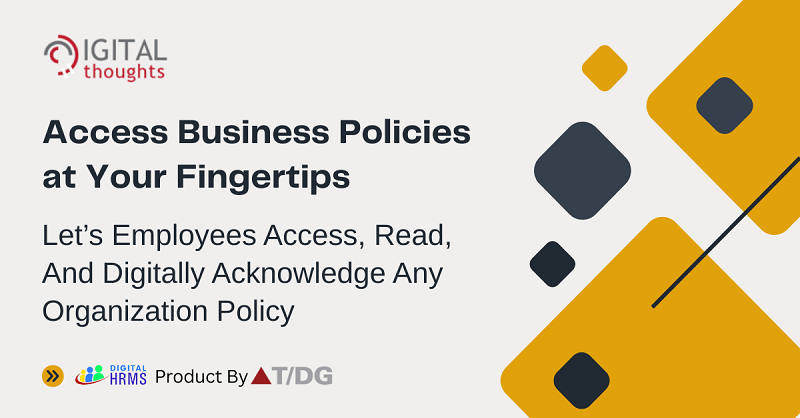Detailed Guide to Modern Human Resource Management Software: Easily Access Smarter HR Policy Documents Across India

“Clear policies empower people — confusion undermines productivity.”
It is now essential to have easily accessible policies in the fast-paced workplace of today. Compliance is at risk, audits take a long time, and staff members are left in the dark when hr policy documents are dispersed throughout emails or hidden in folders. Paper trails are thankfully a thing of the past.

What are HR Policy documents?
HR policy documents cover a wide range of topics related to the employee experience, such as hiring, performance, pay, leave, attendance, safety, and recruitment. They are a set of rules that regulate both employers and employees. Additionally, they provide guidance on how HR teams should handle employee behavior in a variety of work environments, such as remote and hybrid teams. HR policies, whether they are in the form of electronic handbooks or physical documents, are a resource for employees. In areas like employee discipline, they are essential for HR managers because they make sure workers know what is expected of them and provide clear guidelines for progressive discipline and termination. They are necessary to maintain a productive and efficient workplace.
Disjointed Policy Management challenges businesses with decentralized storage, version chaos, manual acknowledgment procedures, outdated documents, difficulty in disseminating new policies, and potential non-compliance and unauthorized access. These problems put organizations at risk for noncompliance and harm to their reputation in addition to slowing down procedures.
Where can I find the HR policy documents?
HR policy documents are typically located on your company's intranet or internal portal. They are typically found by searching for "HR policies," "employee handbook," or "HR documents" using the portal's search feature, or by browsing through sections reserved for employee resources or company information.
A good employee experience, increased transparency, fair treatment, and the development of trust all depend on having HR policies easily accessible in one place. By giving workers clear information about their rights, responsibilities, and company policies, it lessens misunderstanding, reduces conflict, and promotes a more productive work environment.
Why Should I keep all HR policy documents in one place?
- Clarity and Transparency: Having HR policies in one place guarantees that all staff members have access to the same data, which fosters clarity and minimizes uncertainty. This reduces the possibility of misunderstandings or inaccurate information, resulting in a workforce that is better informed and more involved.
- Consistency and Fairness: Regardless of their department or position, all employees are guaranteed to be treated fairly and consistently by clearly stated and easily accessible policies. By reducing the possibility of prejudice or favoritism, this consistency promotes equity and trust.
- Empowerment of Employees: Workers feel more empowered and secure in their positions when they are aware of their rights and obligations. In addition to encouraging self-sufficiency and lowering dependency on HR for basic information, accessible HR policies offer a framework for handling workplace circumstances.
- Less Conflict: By establishing clear expectations and offering a structure for settling disagreements, easily accessible policies can aid in the prevention of conflicts at work. A more peaceful and effective workplace may result from this.
- Better Employee Experience: A central location for HR policies enhances the general positive employee experience by facilitating information access, expediting procedures, and fostering equity. Employee engagement, job satisfaction, and turnover may all rise as a result.
- Legal Compliance: Having policies that are simple to find guarantees that the company complies with labor laws and regulations, which lowers the possibility of legal problems.
- Simplified Onboarding: HR policies in one place can greatly enhance the onboarding experience for new hires. A smoother transition into the company is made possible by the quick access to information that new hires need to comprehend their roles, responsibilities, and company culture.
A Smarter Way: HR Policy Management with Digital HRMS In India
A thorough HR Policy Documents Module provided by Digital HRMS turns policy handling into a smooth, paperless process. This is how it operates:
- Centralized Version Control and Repository
There is no longer any uncertainty about which version of the company's policies is current because they are all kept in one safe location.
- Adaptable Access & Private Information Exchange
Only the intended audiences can view sensitive policies due to HR's ability to assign document visibility based on roles.
- Self-Attestation Automatically
Employees eliminate the headache of email chains by reading new policies and digitally acknowledging compliance. HR can keep track of who has and has not signed off.
- Metrics & Dynamic Reporting
To monitor attestation rates across departments or geographical areas, create custom reports and export them in Word, Excel, or PDF formats.
- Email Alerts & Reminders
No employee will overlook a policy update or signature deadline due to automated notifications.
Why opt for Digital HRMS in India?
By automating HR policy management, the implementation of a digital HRMS in India significantly reduces the risk of document mishandling and manual labor. It supports audit readiness through transparent procedures, helps organizations keep their policies current and compliant, and improves data security by allowing role-based access control for sensitive data.
Conclusions
Policies that are forgotten or hidden don't work. Digital HRMS makes it easy, secure, and audit-ready to manage policy documents. Employees know where to find them, HR is reassured that they have been identified, and compliance is made easy.
Ultimately, having easy access to employee policies helps Indian businesses stay ahead of regulatory changes, reduce compliance risks, and foster an accountable and transparent culture—all of which enhance their ability to operate morally and effectively in a complex business environment.
